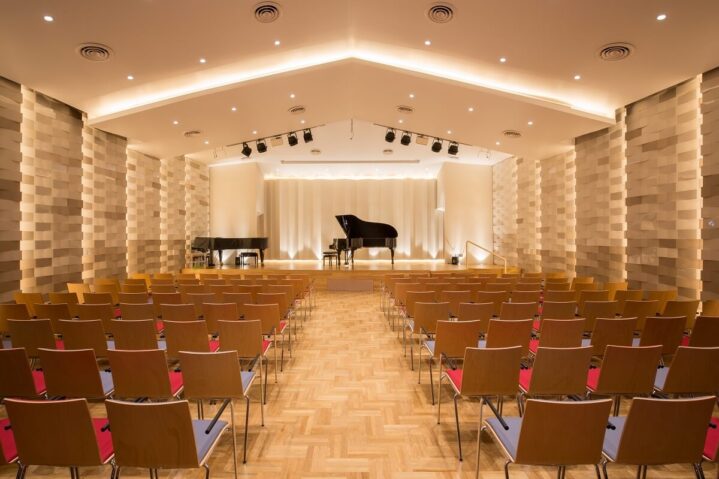
The Goethe-Institute Bangkok: A German institution in Thailand
“He who knows no foreign languages knows nothing of his own” (Johann Wolfgang von Goethe).
Most of us know how it feels to learn a new language. Looking back on our school days, language classes rated amongst the least popular. We were amazingly adept at finding ways to skip them. Vocabulary lists and spelling tests still haunt most of us. But now that it’s all over – isn’t it just awesome to be able to chat to someone in a foreign tongue?
When we travel abroad, we realize just how important and useful it is to be able to communicate with the locals. Whether it’s for business or pleasure, we need to master at least one other language to avoid being branded an ‘outsider’ or ‘uneducated’. But besides work and travel, there are enough other incentives to make us want to learn a new language.
Take relationships, for example. Wouldn’t it be nice to talk to your partner in his/her mother tongue? Or you might want to prepare yourself for a course of study, an exchange programme or a career abroad. Perhaps in Germany? This is where the Goethe-Institute comes into play. The non-profit association founded in 1951 by six German teachers has long since become part of a global network. It has set itself the task of promoting the German language abroad, fostering international cultural cooperation and conveying a comprehensive, up-to-date picture of Germany to students of all ages.
Public acclaim and figures show that it works: 34 million people visited the ‘www.goethe.de’ website, 14 million attended 30,000 cultural events and the Goethe-Institute boasts 4.1 million international Facebook fans! In Germany alone, the Goethe-Institute has branches in 12 cities. Abroad, there are a further 160 institutes and liaison offices in 98 countries. Approximately 3,000 people are employed in the language departments and 270,000 people worldwide attend German courses there every year.
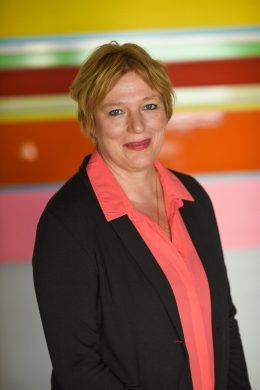
“Behind these figures lies an infinite treasure trove of stories from all over the world,” writes media personality Maren Niemeyer on her website, niemeyer-film.de. “There are anecdotes and accounts from rich and poor countries, from holiday paradises and areas of crisis, from old dictatorships and young democracies, from the Far East and the Middle West. Tales of pioneering spirit and new beginnings, about fantasy and enthusiasm, about passion and the art of improvisation about success but also about failure and cultural misunderstanding”.
The German TV journalist, documentary film director and film producer knows what she is talking about. This successful woman, who has produced various cultural and political programmes for numerous well-known national and international television stations since 1995 – including the two part documentary “Planet Goethe” on the occasion of the cultural institute’s 60th birthday in 2011 – is now herself director of the Goethe-Institute in Thailand. Prior to this, she worked for 6 years as television and radio broadcasting representative at the Institute’s headquarters in Munich.
“My job took me to 40 different Goethe-Institutes worldwide. From Kabul to Addis Ababa and from Sarajevo to Buenos Aires, Hanoi and Helsinki. These experiences made me want to lead one myself. As much as I love film and television work, it’s always very short-term and there’s not much left behind – the film contributions transmit their message themselves. Working as director of a cultural institute, on the other hand, is much more sustainable and long-term. You have 5-6 years to develop your very own thematic focus in the field of cultural work – in principle it’s very similar to the work of an artistic director.”
Since July 2016, Thailand has been second home to our Bremen born interviewee. Her dream came true when she was asked to head the Goethe-Institute in Bangkok until the year 2022. At first she questioned what it would be like to work and live in a country where everyone else goes on holiday. Two years later she concludes: “It may be the hottest megacity in the world, but living here is fantastic. As a journalist and filmmaker I travelled the world and got to know many interesting cities but I have never experienced a city as exciting, adventurous, spiritual and versatile as Bangkok. I’m almost addicted to this breathtaking sensory explosion!”
These are by no means empty words. Now in her mid fifties, Maren Niemeyer takes advantage of every free weekend to explore and visit places recommended to her by her Thai colleagues. But most often you’ll find Maren Niemeyer in her office, or in action – even at the weekends when cultural events take place in or outside the Institute. As director of the GI, she is always on call. As she once said in a TV interview: “The Thais have high expectations of us Germans. They see us as great managers and good organisers and they admire Germany because the country is economically very successful. So they would like us to somehow pass on our know-how to them.” That’s exactly what Maren does!
“Knowing is not enough; we must apply. Being willing is not enough;we must do” (Johann Wolfgang von Goethe).
Every year, around 7,000 language learners attend German courses at the Goethe-Institute Bangkok. Students and the general public can enjoy free use of the library, where they can find information about Germany or borrow books, videos and games.
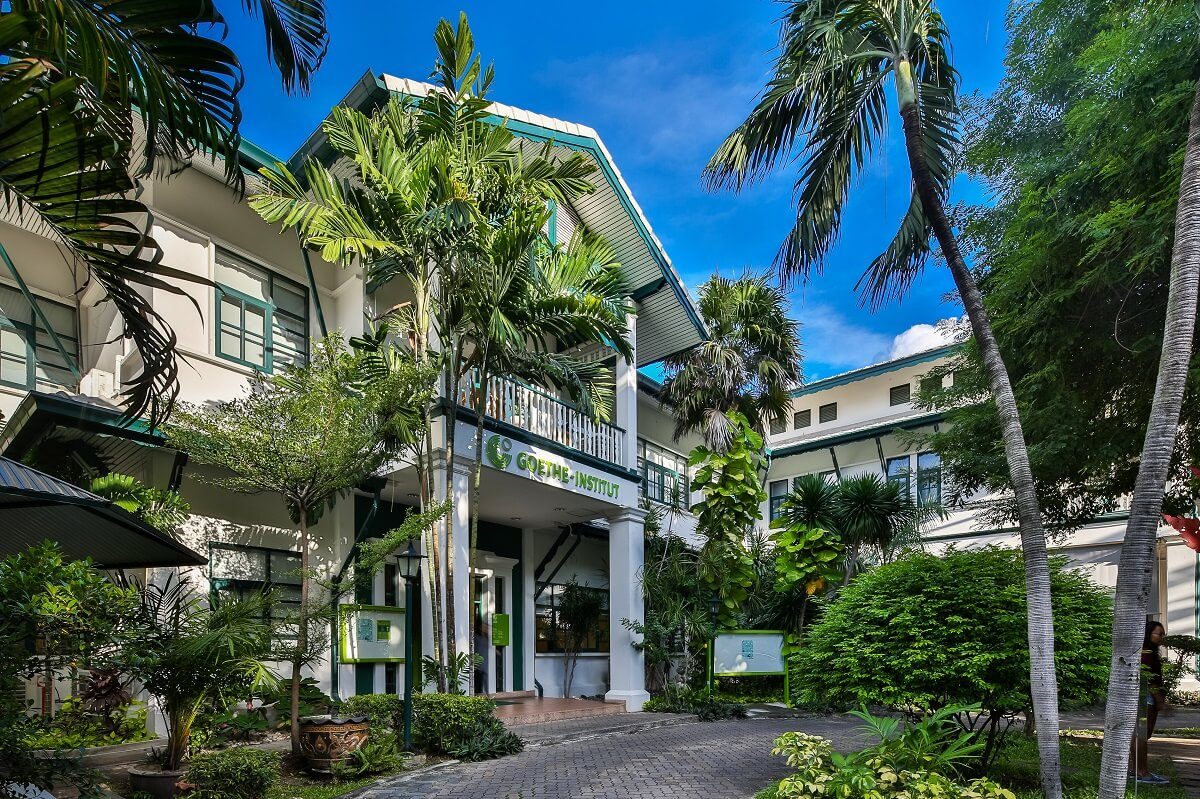
‘Khun Maren’ tirelessly beats the drum for the institute and its cause, making use of her excellent contacts on the international and Thai cultural scene and initiating exciting supporting programmes
The latter are particularly close to her heart. These are the events that give the language students the opportunity to mingle with German speakers. Here,they can converse, put what they have learned into practice and get to know the German culture and way of life, be it through film, music, dance, theatre, festivals or exhibitions.
Although every student is aware that knowledge of a second language opens doors and offers numerous private and professional advantages, motivating oneself to learn can be very difficult and frustrating. I know that from my own experience. After 12 years of expat life in Bangkok unfortunately I haven’t learned much Thai. It is just as big a hurdle for Thais to learn German as vice versa. Maren Niemeyer is well aware of this. “That’s why we organize around 150 cultural events every year – to motivate, inspire and animate”.
“Instruction does much, but encouragement does everything” (JohannWolfgang von Goethe).
In this sense, the tall blonde German has already made several changes and improvements since taking up office in Thailand. I can judge that myself as I have been a frequent visitor to the GI Bangkok for the last 10 years. Now a fresh breeze is blowing and freedom to act and implement original ideas is granted, indeed encouraged, by the headquarters in Germany. Thus, each individual Goethe-Institute worldwide is strongly influenced by the personality of its director.
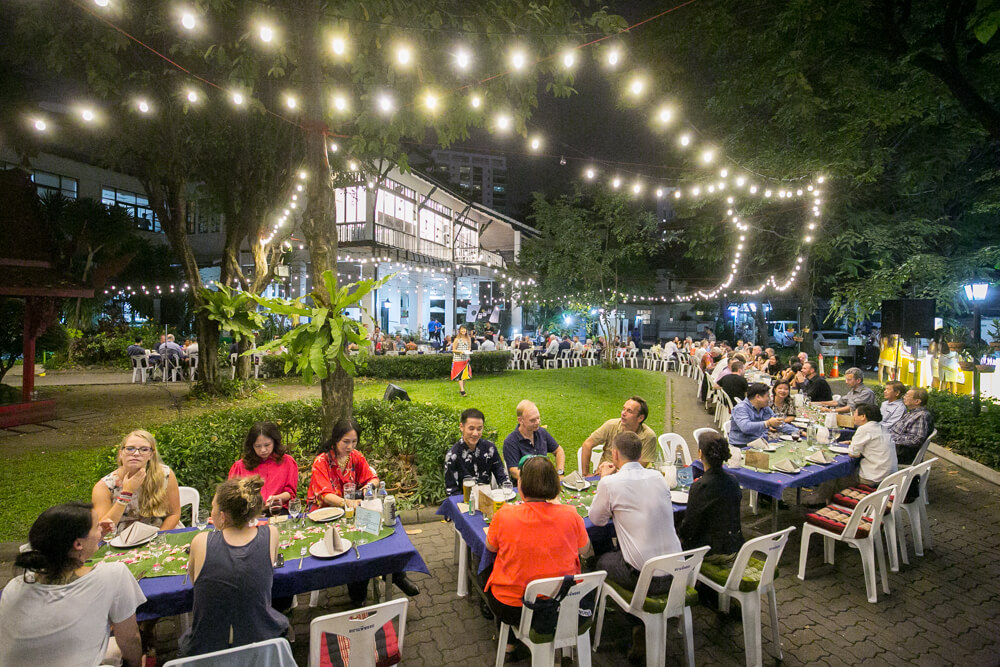
The numerous events of the last 2 years clearly bear Maren’s trademark. Every idea, every project is meticulously thought through – just like the scripts she wrote during her earlier film career. With knowledge, charm and great commitment to the cause, she continues in the role of director in her current position, staging each event so skilfully that it will be remembered for time to come.
An example of this is ‘Wanderlust Kuche – A Culinary Dialogue’. This gourmet festival took place in November 2018 in the grounds of the Goethe-Institute in ‘Soi Goethe’. By the way, the street name is nojoke! In the City of Angels, the great German poet and thinker was indeed immortalised years ago with his own “Soi” in Sathorn district.
On a warm summer night, 120 invited guests gathered around beautifully set tables in the garden of the institute in eager expectation of the very unusual culinary journey that was to follow. “An innovative cultural format towards international understanding. One that brings delicious food to the table and, at the same time, breaks down so many prejudices,” as the hostess emphasised during her speech.
“German cuisine doesn’t just consist of the cliched roast pork or fried sausages with sauerkraut and dumplings. Fatty, heavy, bland food is a thing of the past. Healthy fusion cuisine is now the trend! It is my strong desire to make this development better known in the SE Asian region as well”.
No sooner said than done: the “culinary dialogue” was born. Commissioned by the Goethe-Institute’s of SE Asia, Australia and New Zealand, a German chef partnered up with a local chef to take part in a regional food festival which lasted several weeks.
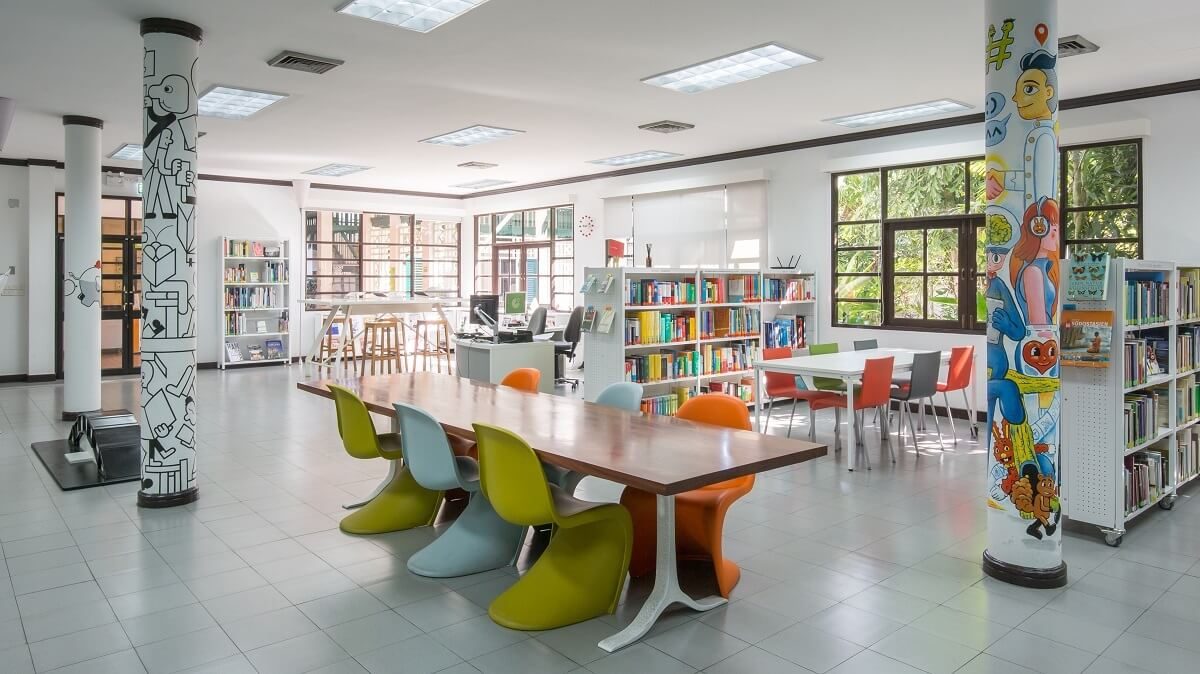
“Nothing connects people of different origins more than a delicious meal. The food culture is a very basic component of a country. What I especially love about Thailand is the warm hospitality of the people, their sociability and their love of food,” Maren enthuses about her new home. One usually greets others with the words “Have you already eaten” (ginn khau ruu yang)? This sentence reflects the soul of the Siamese Kingdom”.
And the culinary summit “Wanderlust Kuche” was certainly an all-round feel-good affair. In Bangkok, top German chef Mirko Trenkner from Hamburg and Thai chef Duangporn ‘Bo’ Songvisava (co-owner of the Michelin Guide award-winning restaurant Bo.Lan) stirred up a menu with a “WOW” effect, which combined typical Thai ingredients with Thai- German culinary art. And this culinary highlight was just a starter! The event menu continued over the course of several weeks with cooking and baking courses, culinaric cinema, readings, workshops and panel discussions. The topics covered included sustainability, organic nutrition and the preservation of traditional cuisine.
This proves that it is well worth serving up surprises and breaking new ground from time to time. “For me, taking a new course means expanding the concept of culture,” says Maren. “Culture should not be confined to the tower like Sleeping Beauty. It should be accessible to the general public. I’m not afraid of popular entertainment formats because these are precisely the projects that breakdown the fear of contact between different cultures.
The “Spark of Hope” exhibition, ran to the end of January, was also a visual treat. Particularly impressed by his visit to northern Thailand, the Mainz-based professional photographer Jonas Werner-Hohensee decided to draw attention to a children’s home in Phrao with some extremely sensitive photography. The home, in Northern Thailand, was founded 10 years ago by the German Gunter Oppermann. The Goethe-Institut Thailand supported Jonas’ cause and organised this in house photo exhibition in Bangkok. The focus was not only on the exemplary work of the children’s aid organisation, but also on the social exclusion and bitter poverty of the mountain people. “Anyone who has ever travelled through these regions and has a heart for people in need will never forget the experience” said Jonas, at the opening of the exhibition in October 2018.
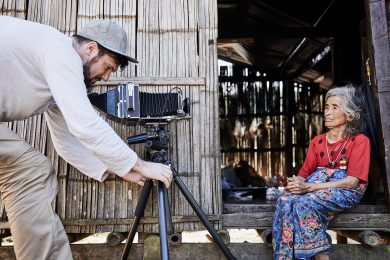
The photographer spent 6 weeks in the children’s home. He accompanied the students in their everyday life and on their way to their families in the mountain villages. “On the one hand, their eyes were bright, eager to learn and open to everything new. On the other hand, the eyes of these village kids were old,” says Jonas Werner-Hohensee, depressed. “There was no sparkle. Only fear.”
These young people have no opportunities for further development. They only know poverty, illness and stress.
“This is where the ‘Spark of Hope’ Foundation (‘Hoffnungsfunke e.V.’) comes in,” says Maren. “Gunter Oppermann and his Thai team have been providing accommodation, care, security and education for the children and young people for a decade now – we have seen this for ourselves. Oppermann is making a culturally important contribution”. Since the Goethe-Institute takes a strong interest in civil society, Maren Niemeyer decided to stage this photo exhibition in Bangkok.
Now the director of the Goethe-Institute is looking forward to other upcoming events, such as the performance of the legendary German jazz formation “Trionauts” (Mahidol Jazz Festival, end of January), the 12 strong Bavarian punk brass troupe “La Brass Banda” (on the Cheng Chui grounds, beginning of March), the German Film Week, the annual Science Film Festival and numerous exhibitions. All schedules are published on the institute’s homepage and in the newsletter.
The highlight par excellence, however, is and always has been the Open Air Cinema. German films with English/Thai subtitles will be screened in the garden of the Goethe-Institute every Tuesday at 19:30 from 8 January until 5 March. For decades, this has proved an extremely popular event for locals and expats alike. Entrance is free of charge.
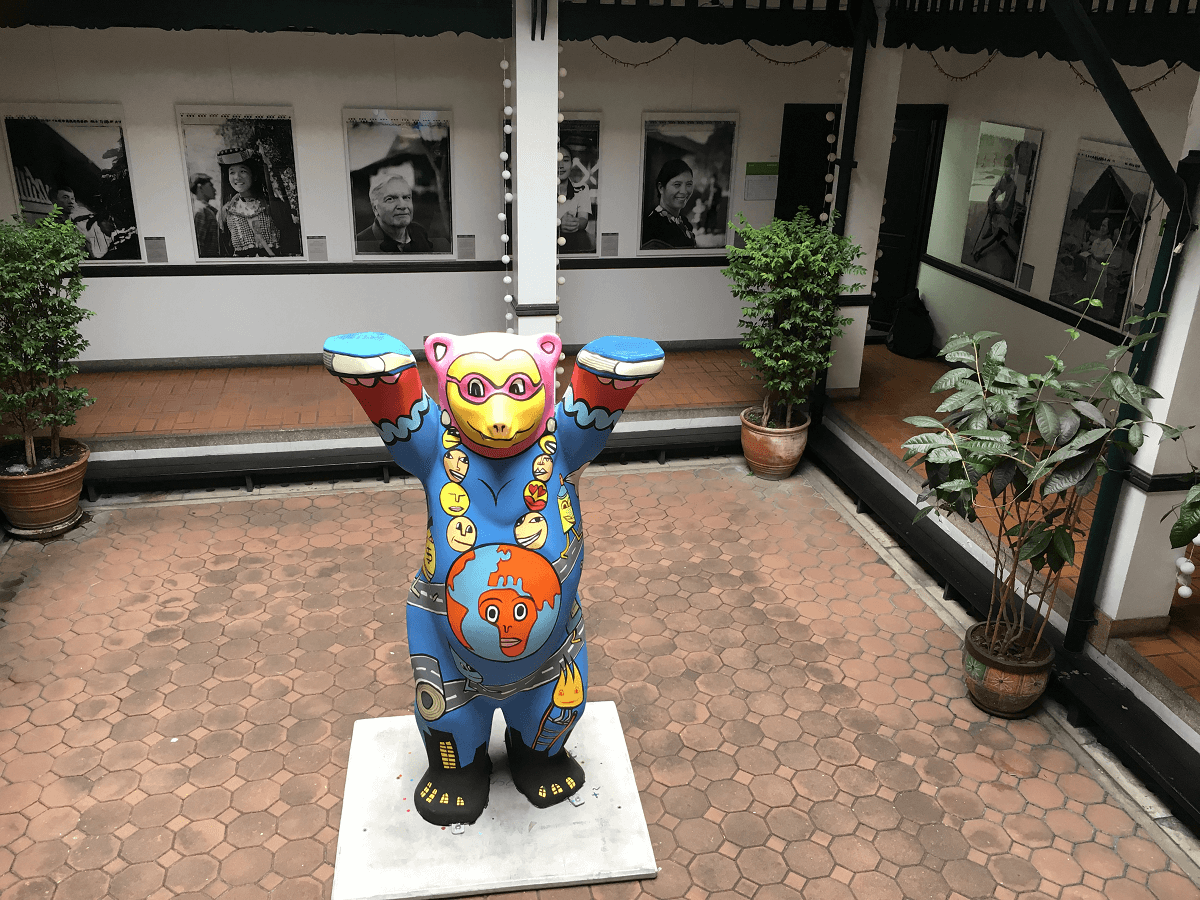
Does Maren Niemeyer perhaps have something special in mind that she would like to see implemented during her term in office? “Yes,” she tells me with a smile. “In 2020, when the Goethe-Institute Thailand turns 60, I would like to serve our course participants and visitors a wonderful birthday cake with many different ingredients: a Bauhaus exhibition, a documentary film about the history of the Goethe-Institute Thailand, an electronic music festival… and our typical German Christmas market with Christmas cookies and mulled wine!
Goethe-Institut Bangkok, 8/1 Soi Goethe, Sathorn 1, Bangkok 10120 Thailand Tel. + 66 2108 8200. Fax + 66 2108 8299. E: [email protected] Contact: Maren Niemeyer (Director). Email: [email protected] Information about language courses and event schedules at the Goethe Institute Thailand: www.goethe.de/thailand. Open Air Cinema: [email protected]


